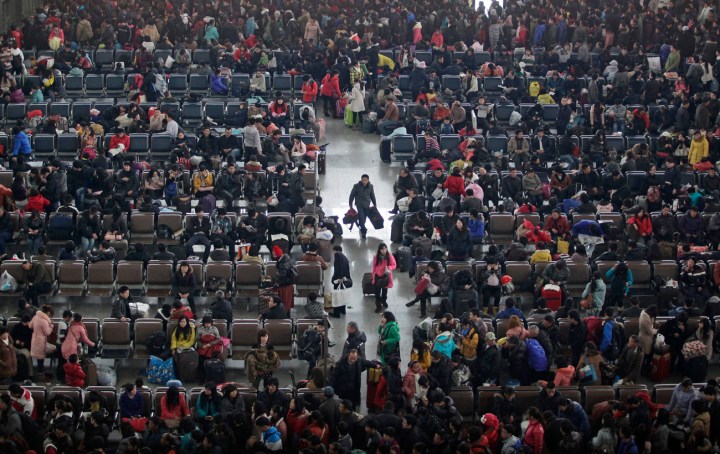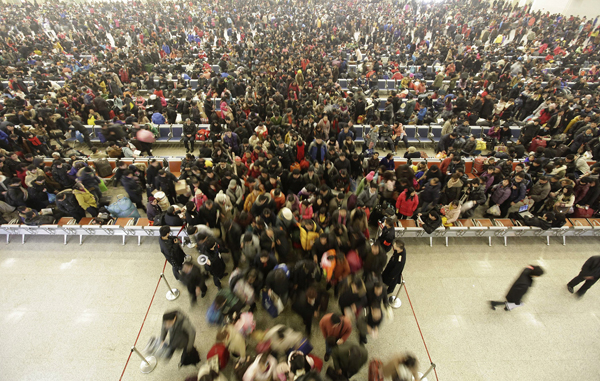Politics
The Year of the Dragon and the world’s greatest migration

The end of January marks the culmination of the holiday travel period in China in which as many as 300-million or so people, attempt to get to their ancestral village, or from their village to family members in big cities. This year, however, the usual chaos and overcrowding for the holiday period was supposed to be over through a magical intervention of internet. Wrong. By J BROOKS SPECTOR.
This writer confesses to being an inveterate train fan, almost any kind of passenger train. Whether it is across the continental US or the island of Java via the night express, down the spine of the Malay Peninsula, to anywhere via speedy bullet trains and locals in South Korea and Japan, up the funicular railroad to the top of Victoria Peak in Hong Kong – and on the old Trans Karoo from Johannesburg to Cape Town and back. On a train, one actually talks with people, watches scenery, eats bakmi goring in Java, a special o-bento box meal in Japan, or SAR’s old-fashioned oxtail soup with a bottle of the familiar Railroad Red wine.
Almost anywhere by train, in fact, except, perhaps, in China during the national mass migration during the Lunar New Year holiday. The end of January marks the culmination of the holiday travel period in which as many as 300-million or so people, give or take a few tens of millions, attempt to get to their ancestral village, or from their village to family members in big cities, or from one big city to another – roughly the total population of America on the move simultaneously.
Travel and short story writer Paul Theroux, and the man who became one half of a great literary fight with VS Naipaul, had great, popular success with his railroad storytelling in “The Great Asian Railway Bazaar” and “The Patagonia Express”. These traveller’s tales came before he tackled China’s vast rail network for his travel writing piece de resistance, “Riding the Red Rooster,” (named after a particular steam locomotive) but it is certain he didn’t try to do his riding during the Lunar New Year holiday.
For millennia, the vast majority of China’s population lived, worked and died in its millions of farming communities and small rural towns. Celebrations were local. War, civil disorder, the communist revolution all contributed a major population shift towards the cities, but the economic liberalisation and extraordinary growth that followed the Cultural Revolution and the millions of urban jobs this transformation has created – and continues to generate – gave a decisive push to China’s great urban migration. That, in turn, has set the stage for the enormous population surge back home each Lunar New Year period.

Photo: A migrant worker checks his mobile phone while waiting for his train at the Beijing railway station, January 19, 2012. REUTERS/Jason Lee
The Chinese government has responded with a major overhaul of its rail network and added shinkansen look-alike, bullet train-style lines between major urban conurbations. And it is planning, dreaming and imagining SF-like maglev trains barrelling along at 300+ kilometre per hour speeds. By 2010, China had more than twenty principal railway routes that ran for around 91,000 km – and the network continues to grow.
However its pell mell, rapid expansion into those signature super high speed trains came to a halt when an accident in Wenzhou in the summer of 2011 – killing 39 people and injuring 200 more – occurred due to signal failures in a thunderstorm. In the safety review that followed, some of its new trains were removed from service and overall expansion pace for the new lines has been much slowed down. Meanwhile, the World Bank has now urged China to look further at other nations’ management of rail networks in which the same body does not simultaneously own, operate, profit from and regulate railways. That is never a good thing. “Who will guard the guardians?” remains as true as ever.
The World Bank study said in part “Today China has by traffic volume the world’s second busiest freight railway and the busiest passenger railway. This remarkable growth in China’s railway network was achieved under a railway governance and institutional structure unique to China. Changes in transport competition together with the desirability of a more coordinated national transport system suggest that China’s railway industry may wish to consider an alternative structure.” Or, in less diplomatic language, pull up your socks before more people are hurt or killed.
The Los Angeles Times added that despite China’s efforts to improve services, “It’s been a bruising Year of the Rabbit for the Ministry of Railways, one of China’s least popular bureaucracies. The agency saw its chief fired in February amid allegations of corruption. In July, 40 people were killed after a collision on the nation’s showcase high-speed rail line.”
This year, however, the usual chaos and overcrowding for the holiday period was supposed to be over. The government introduced its new Internet-based ticketing system that was supposed to bring order into purchasing tickets – and then using them – as the population tried to make it home for the holiday, putting to an end those terrible but extremely visual mob scenes in the country’s train stations as millions surged forward to get on board before the holiday began in earnest.
In the six weeks before, during and after the Lunar New Year festival, China estimates more than 3-billion (yes, that is billion) trips – the equivalent of two trips for every single person in China – will be taken via planes, trains and buses, as hundreds of millions of people head home for the holiday – and do a bit of jolling around it seems.
But, just as clearly, the Chinese government didn’t do enough to prepare its Internet service for the demands people would place on it. Its website reportedly received over a billion visits a day the first week of January, crippling its servers. The number of visits to the site, on 9 January alone, was equal to 0.04% of all Internet page views globally that day. That was the day train tickets became available for Saturday, 21 January, the last day before Lunar New Year’s Eve, when Chinese families are supposed to already have gathered so they can share a great family banquet and set off those traditional fireworks.

Photo: Passengers queue up in lines to board trains through the waiting hall of Hankou Railway Station in Wuhan, Hubei province January 15, 2012. REUTERS/Stringer
Critics say the new system has actually made it harder for China’s poorest and least educated workers to snag coveted train tickets – and such people are the largest number of would-be purchasers. Buying a seat online requires an e-banking account and access to a computer or smart phone, still rarities among the millions of migrants who toil as construction labourers, custodians and maids in all of China’s urban areas.
As America’s National Public Radio reported it, “…things didn’t work out as planned. Volume on the new train ticket website has been so heavy – one day it got 1.4-billion hits – that it has often crashed. Other times, the website charged people money without actually giving them tickets. A migrant worker surnamed Li said he had to strategise with colleagues to reserve his ride home to see his family in far western China. Li said ‘I found several co-workers and we used three computers – three computers – continuously for five to six hours,’ said Li, as he warmed himself in a pedestrian underpass at Shanghai Railway Station. ‘Then, we finally got into the site and ordered two tickets’.”
Another passenger named Huang Qinghong told the radio network that he went to the station four different times to try to score a ticket so he could get home to his family and “When I got to the window, there were no tickets left. Later we learned we could buy tickets online.” But because he doesn’t yet understand how to access the Internet (although more than 300-million of his countrymen and women now do use it), he tried to get co-workers to help. But it took them forever to log onto the site, Huang said, and then they found all the tickets were sold out. Huang then wrote a hypercritical letter to the national rail minister and sent a copy to a local newspaper, pointing out that the people who make up the bulk of the holiday travellers – migrant workers – have little education and don’t know how to use computers either.
Huang’s letter read “You guys sitting on couches in air-conditioned offices, sipping tea, smoking cigarettes and coming up with buying tickets online, have you ever considered our lives? Have you experienced the agony of buying tickets?” Inevitably in this day and age Huang’s letter went viral and he became an instant folk hero for defying the big men in their fancy offices.
Huang finally made it home this year – although he may still be struggling to return to his usual place of work as his holiday comes to an end. He said that his trip has usually taken 30 hours to complete. Ultimately he needed only two-and-a-half hours this time around, but that’s only because the newspaper he wrote his scathing letter to gave him a free air ticket to get home. He told reporters by cell phone from his home village “My fellow villagers all said flying must be very comfortable. They felt happy for me and they were envious.” The holiday has probably been a bit less convenient for the other 299,999,999 of his countrymen trying to ride the rails, however.
Interestingly, as China becomes more and more prosperous, a growing number of Chinese are electing to skip that arduous trek home for the rounds of celebratory dinners and the distribution of those ubiquitous and obligatory red and gold gift envelopes containing money – hongbao. Instead they are traveling out of the country. The data already says some 64,000 people from Shanghai have gone abroad this time around, up over 11% from 2011 – and this total is three times the number of people returning to Shanghai for the holiday.
In previous years, traditional destinations for holiday travel have been Japan, South Korea, Hong Kong, Macao, Taiwan, Singapore, Malaysia, Thailand as well as some European nations – but newly popular destinations include Sri Lanka, Hawaii, New Zealand and the Maldives. In fact, according to Maldives tourism officials, China is now the largest source of tourists to the country, up from fourth place two years earlier. Hotels now offer festive Chinese dinner buffets, waiters and waitresses are studying Mandarin, and Chinese signboards are visible at the country’s airports and restaurants.
And the Seychelles is stepping up its game to attract Chinese holiday travellers eager to give the traditional homecoming a pass as well. The Chinese media has reported that the Seychelles’ ambassador to China went to the airport to personally see off a group of 152 Chinese tourists on a chartered flight to his country for the holiday. As the marketing manager of the China Travel Service commented, “[The] Seychelles is working to draw Chinese tourists and has launched theme tours featuring its volcanoes and traditional artwork.” And so where are you South African tourism officials? It’s too late for 2012, but next year beckons and China’s not getting any poorer.
However, in keeping with family tradition in our house for any major holiday, anywhere in the world, we elected not to travel far for the Lunar New Year holiday. We did, however, find ourselves seated in a local Chinese restaurant for a duck feast that left the writer and his family feeling very content – and very full – and with only a five-minute drive home. DM
For more, read:
- Better-off Chinese travel abroad for Lunar New Year at the Xinhua;
- Not-So-Happy New Year: Rail Website Woes In China at the NPR;
- Chinese fume over train ticketing system as Lunar New Year nears at the Los Angeles Times;
- China’s rail system tested as massive migration begins at the Globe and Mail;
- China Train Schedule/Timetable, Book China Train Tickets On-line! At China Highlights.com;
- Rail chaos as millions of Chinese travellers head for home – audio slideshow at the Guardian;
- China’s New Year: there be dragons, but not enough train tickets at the Christian Science Monitor;
- Weather puts China’s rail system to test at China.org;
- China bullet train crash ’caused by design flaws’ at the BBC;
- Seeing red envelope during festival at the Washington Post/China Watch.
Main photo: A man carries his belongings as he walks through the hall of Wuchang Railway Station in Wuhan, Hubei province January 8, 2012. REUTERS/Stringer






 Become an Insider
Become an Insider